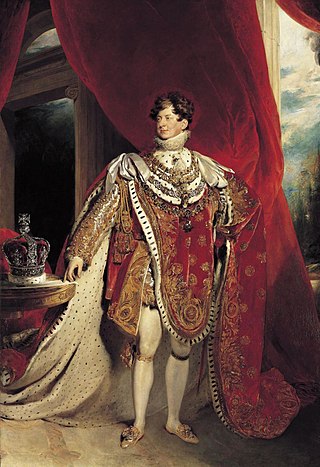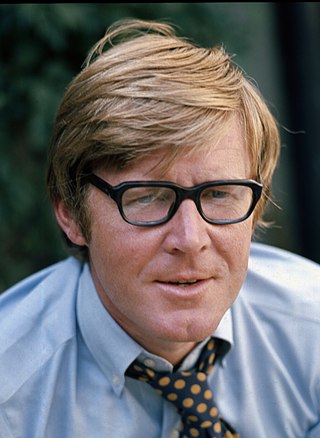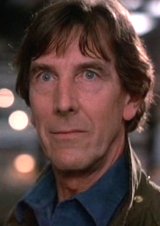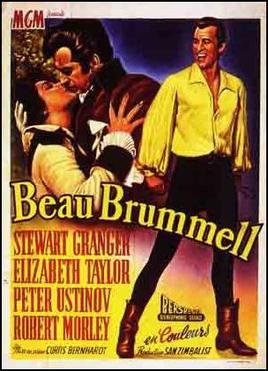
George IV was King of the United Kingdom of Great Britain and Ireland and King of Hanover from 29 January 1820 until his death in 1830. At the time of his accession to the throne, he was acting as prince regent for his father, King George III, having done so since 5 February 1811 during his father's final mental illness.

Alan Bennett is an English playwright, author, actor and screenwriter. Over his entertainment career he has received numerous awards and honours including two BAFTA Awards, four Laurence Olivier Awards, and two Tony Awards. He also earned an Academy Award nomination for his film The Madness of King George (1994). In 2005 he received the Society of London Theatre Special Award.

Sir Nigel Barnard Hawthorne was an English actor. He is known for his stage acting and his portrayal of Sir Humphrey Appleby, the permanent secretary in the 1980s sitcom Yes Minister and the Cabinet Secretary in its sequel, Yes, Prime Minister. For this role, he won four BAFTA TV Awards for Best Light Entertainment Performance.

Maria Anne Fitzherbert was a longtime companion of George, Prince of Wales. In 1785, they secretly contracted a marriage that was invalid under English civil law because his father, King George III, had not consented to it. Fitzherbert was a Catholic and the law at the time forbade Catholics or spouses of Catholics from becoming monarch, so had the marriage been approved and valid, the Prince of Wales would have lost his place in the line of succession. Before marrying George, Fitzherbert had been twice widowed. Her nephew from her first marriage, Cardinal Weld, persuaded Pope Pius VII to declare the marriage sacramentally valid.

Richard III is a 1995 period drama film, based on William Shakespeare's play of the same name, directed by Richard Loncraine. The film adapts the play's story and characters to a setting based on 1930s Britain, with Richard depicted as a fascist plotting to usurp the throne.

Dame Helen Mirren is an English actor who became an American late in life. With a career spanning 60 years, she is the recipient of numerous accolades and is the only performer to have achieved both the American and the British Triple Crowns of Acting. Mirren has received an Academy Award and a BAFTA Award for her portrayal of Queen Elizabeth II in The Queen, a Tony Award and a Laurence Olivier Award for portraying the same character in The Audience, as well as three British Academy Television Awards and four Primetime Emmy Awards for her role as DCI Jane Tennison in Prime Suspect.
Sir Nicholas Robert Hytner is an English theatre director, film director, and film producer. He was previously the Artistic Director of London's National Theatre. His major successes as director include Miss Saigon, The History Boys and One Man, Two Guvnors. He has also known for directing films such as The Madness of King George (1994), The Crucible (1996), The History Boys (2006), and The Lady in the Van (2015). Hytner was knighted in the 2010 New Year Honours for services to drama by Queen Elizabeth II.

George Richard Ian Howe, known professionally as George Fenton, is an English composer. Best known for his work writing film scores and music for television, he has received five Academy Award nominations, several Ivor Novello, BAFTA, Golden Globe, Emmy and BMI Awards, and a Classic BRIT. He is one of 18 songwriters and composers to have been made a Fellow of the Ivors Academy.

John Wood was an English actor, known for his performances in Shakespeare and his lasting association with Tom Stoppard. In 1976, he received a Tony Award for Best Actor in a Play for his performance in Stoppard's Travesties. He was nominated for two other Tony Awards for his roles in Sherlock Holmes (1975) and Rosencrantz and Guildenstern Are Dead (1968). In 2007, Wood was appointed a Commander of the Order of the British Empire in the Queen's New Year Honours List. Wood also appeared in WarGames, The Purple Rose of Cairo, Orlando, Shadowlands, The Madness of King George, Richard III, Sabrina, and Chocolat.
The 49th British Academy Film Awards, more commonly known as the BAFTAs, took place on 23 April 1996 at the Theatre Royal, Drury Lane in London, honouring the best national and foreign films of 1995. Presented by the British Academy of Film and Television Arts, accolades were handed out for the best feature-length film and documentaries of any nationality that were screened at British cinemas in 1995.

Beau Brummell is a 1954 British historical film released by Metro-Goldwyn-Mayer. It was directed by Curtis Bernhardt and produced by Sam Zimbalist from a screenplay by Karl Tunberg, based on the 1890 play Beau Brummell by Clyde Fitch. The play was previously adapted as a silent film made in 1924 and starring John Barrymore as Beau Brummell, Mary Astor, and Willard Louis as the Prince of Wales.

The Madness of George III is a 1991 play by Alan Bennett. It is a fictionalised biographical study of the latter half of the reign of George III of the United Kingdom, his battle with mental illness, and the inability of his court to handle his condition. It was adapted for film in 1994 as The Madness of King George.
Andrew William Dunn BSC is a British cinematographer, best known for his collaborations with Robert Altman, Nicholas Hytner, Lee Daniels and Mick Jackson. He is the recipient of three BAFTA Awards, a British Society of Cinematographers Award and an Evening Standard British Film Award.
George III has featured in many examples of popular culture.
George IV of the United Kingdom has been depicted many times in popular culture.
Julian Neil Rohan Wadham is an English actor of stage, film and television.

Prince Regent is a British period television series made and transmitted by the BBC in 1979. It depicts the life of George IV from his youth time as prince regent and his reign as King. It consists of eight episodes of 50 minutes.
The 16th London Film Critics Circle Awards, honouring the best in film for 1995, were announced by the London Film Critics Circle in 1996.

National Theatre Live: 50 Years On Stage is a 2013 live staged event film directed by Nicholas Hytner. Shown in theatres and on PBS and National Theatre Live. The program is presented by The Royal National Theatre which celebrates 50 years of theatre, with some extracts of the best productions from the last five decades including Alan Bennett, Noël Coward, David Hare, Tony Kushner, Eugene O'Neill, Harold Pinter, William Shakespeare, George Bernard Shaw, Tom Stoppard, and Tennessee Williams performed by the countries best performers including Judi Dench, Maggie Smith, Michael Gambon, Helen Mirren, Benedict Cumberbatch, Andrew Scott, Penelope Wilton, Simon Russell Beale, Frances de la Tour, Ian Holm, Derek Jacobi, and Joan Plowright.
The Triple Crown or the Grand Slam are terms used in the entertainment industry to describe individuals who have won the three highest accolades recognised in British film, television, and theatre: a British Academy Film Award, a British Academy Television Award, and a Laurence Olivier Award respectively.












